HIS views are bizarre. His words are extreme. His political experience is nil. So why are so many voters in the United States taking Donald Trump seriously?
Just one election campaign ago, any other candidate uttering a single one of his authoritarian assertions would have been committing political suicide.
In the world according to the word of Trump, women are bimbos. Greed is good. Allies are freeloaders. Muslims must be expelled. Mexicans are rapists. And he’d even date his own daughter.
But Trump looks invulnerable.
He can say what he wants. Do what he wants. Offend whomever he wants. And get lauded for it.
Nobody would accuse him of conforming to any acceptable ‘norm’.
Politicians on both sides of US politics are scrambling for a way to tarnish his appeal.
“They don’t know how to deal with him,” says Flinders University Professor of American Studies Don DeBats. “But they also don’t know how to deal with the issues bothering the American people. More and more of the same thing — be it from the left or right — just isn’t proving attractive.”
Emeritus Professor of Psychology Norman Feather agrees change is an underlying force behind the Trump phenomenon: “Who can bring about change? Can it be Trump? Can it be Clinton? Voters may well discount lots of stupid things that he does because they desperately want some kind of change.”
So who are the people voting for Trump?
And why?
PERFECT STORM
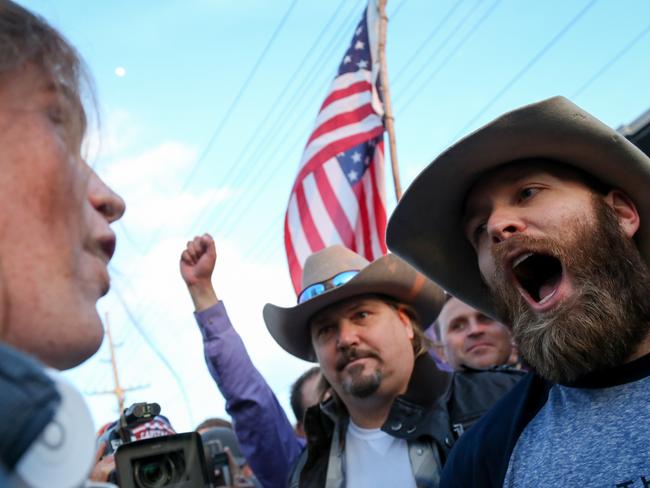
The United States is evolving. Fast.
Long held values have been challenged. Its wo
rking class communities are under enormous strain. Under-employment is deeply entrenched.
Then there’s the matter of national pride. China. Russia. Iran. The US is unaccustomed to being directly confronted.
Lurking in the background is the fallout of the Twin Towers. A fear of terrorism has been undermining confidence since September 11, 2001.
Many feel such physical threats are now at an unprecedented high. On top of all this is the pace of social change. Many established norms are no longer normal.
There’s the growing voice of those previously derided as anti-social outcasts. Gays. Lesbians. Atheists. People of colour.
A once familiar old world is no more. For some, it’s scary. They’re angry.
“They’ve finally found someone who will say what’s on people’s minds — often in some very, very irresponsible ways,” Professor DeBats says.
Emeritus Professor Feather, who pioneered psychological research into relations between values and authoritarianism, says Trump may be attracting voters because of an undercurrent of discontent.
“They see America as slipping back in some sense, they want it to be like it was before — which is where values such as tradition and conformity come in,” he says.
“Old social attitudes and norms are changing. They’re not as important as they were in the past. We’re getting away from what we like, what we’re used to, what people conformed to. So it’s a complex tapestry of how these things interrelate.”
OUTSIDER ON THE INSIDE
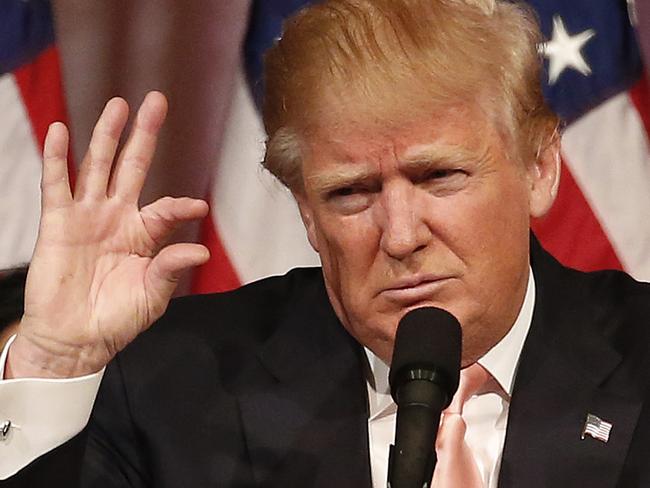
Which of Trump’s platforms makes him so popular?
Is it terrorism? Is it migration? Is it the decline of the white American working class?
The answer is, each of them and all of them. And none of them.
Professor DeBats says polls into Trump’s appeal reveal some very contradictory things.
“He’s a bit unique in the system,” he says. “But his number one virtue, when pollsters ask, isn’t his views on immigration. It’s not government spending. It’s not that he’s strong. The real thing that dominates is that he isn’t ‘one of them’ — a part of the political establishment.”
But there’s also his black-and-white manner.
“Things are this or that, without looking at the subtleties or intermediate shades of grey,” Professor Feather says.” He comes out with these extreme pronouncements. It’s easy. It’s appealing to those who like simple solutions that uphold conventional values.”
Trump’s broad appeal is utterly unexpected.
The usual political demographics just don’t apply.
Income. Age. Religion. None appear to present any particular source of support for this personality bomb with a comb-over.
Has there been a sudden upswing in bigotry, homophobia and xenophobia?
Or is it something else?
Professor DeBats says he feels the controversies swirling about Trumps every appearance are something of a distraction.
A recent Gallup poll of Trump’s supporters show only seven per cent are mainly attracted by his strongman style. One in 10 like his attitude towards immigration. Only one in 20 think he is honest or trustworthy.
More general polls show two thirds of Americans want someone who has experience with the political system.
“He’s certainly not that,” he says. “But the last person his supporters want is a politician. He appeals precisely because he’s an outsider.”
So how can someone with such extreme views as Trump win support from voters who hold very different views?
Combined, the pace of change and sense of insecurity simply seems to beyond what many voters can handle.
They want it stopped.
This is where political science and psychology have reached consensus.
It’s not about Trump.
A portion of the US population appear to have crossed a tipping point.
They may not like the words or the methods. But they like the promise of results.
“This isn’t just a Republican thing,” says Professor DeBats. “If Trump gets to run for president, he’d certainly get Democrat support as well. And no doubt that is worrying Hillary (Clinton)”.
APPEAL TO AUTHORITY
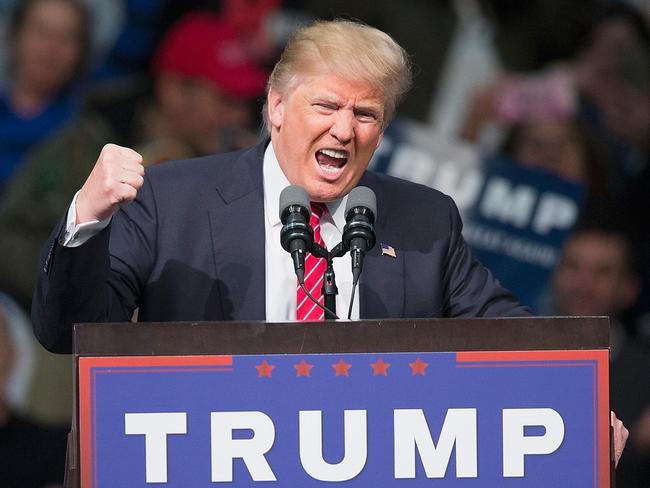
It all boils down to the personal values some voters hold to the extreme. At some point, social scientists say, people start to take things personally. This may make power seem appealing.
Emeritus Professor Feather, author of the influential book Values, Achievement and Justice, says Trump’s appeal may represent a rare convergence of two extreme trains of thought.
One is known as Right Wing Authoritarianism. Values they identify with have a lot to do with tradition, with conformity and with security. They place less value in universalism — things like equality and being honest — as well as hedonism and change.
“Authoritarians have a worldview where we live in a dangerous world, that there are threats coming in from different sides that we have to guard ourselves against. So they may feel insecure,” Professor Feather says. “Their insecurity may be associated with negative attitudes towards out-groups. The authority and conventional values they vote for may be seen as a means of getting rid of the threats that plague them in what they perceive as a country headed in the wrong direction.”
The other is a more Darwinian view of life, known as Social Dominance Orientation. Here people place great value in power and submission, while devaluing equality.
“These people have a world view, not so much that we live in a dangerous world, but that we live in a competitive one where it is dog eat dog and everybody is after what other people have.”
Neither, Professor Feather says, is an exact fit for Trump’s voters.
“Trump himself might be the second kind of authoritarian in valuing dominance and power and really at ease with inequality, whereas many of his followers would probably take a different point of view,” he says. “They may feel that there is too much inequality in their society and that they are the ones being left out.
“So there’s a kind of a paradox in all that.”
But a conjunction between the two is not unknown. Both groups believe themselves to be part of an established authority. That authority is under threat. So the desire to maintain an established order becomes the dominant driver.
It’s the fear of change. It’s a distrust of outsiders. Do they hope to restore the status quo through overbearing authority?
“I don’t know if it’s because he’s a strong man or just an outsider,” Professor DeBats says. “Trump does certainly try to appeal to those fears. His followers see someone who is willing to articulate their views. And Trump’s reality TV approach is certainly doing that.”
Professor Feather, however, says social comparison is another ingredient in the mix.
“When the voters look at the leaders, they probably compare Trump with the current US president. They’re comparing Trump with Obama and they’re involved with a dangerous and competitive world where they’re not getting much out of the pie. They want to see some change, and they see Trump as someone able to do it. So they’re willing in some sense to discount the stupid things he says, as they see him as an agent of change.”
MAN OF MANY FACES
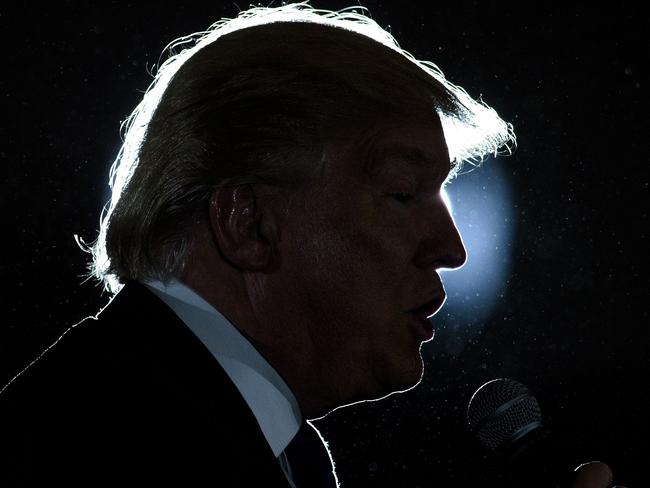
Is Trump simply the first to tap into a need for action?
The ‘strongman’ image Trump likes to present for himself certainly fits the bill.
And he’s particularly good at selling the message — in clear cut, abrupt terms.
Afraid of that influx of outsiders? Trump will build a wall.
Fear the US is losing its status as the world’s strongman? Trump will thump them.
Want homosexuals back in the closet? Trump will slam the door. Blame immigrants for your money woes? Trump will kick them out. Simple. Powerful. Authoritarian.
“It’s hard for a political insider to say those sorts of things, because that’s not how they work,” says Professor DeBats. “It’s not even clear that’s how Trump is going to work should he end up in the White House.”
Which is where the Trump contradiction kicks in.
“He’s willing to take any stance on any given thing — then change his position,” Professor DeBats adds. “That just tells you it’s just the articulation, not the policy, which appeals.”
The Gallup polls appear to support the notion that tough talk is his only real attraction.
“It seems that for some, they’ve finally found in Trump someone who will say what’s on people’s minds — sometimes in very, very irresponsible ways,” Professor DeBats says. “Above all he’s an outsider. He’s not part of this. He didn’t create this.”
Professor Feather, however, feels it comes back to power: “If you were to look at Trump you’d probably think one of the key motivating things that’s pushing him is power. Trump would like his followers to submit. When ‘we live in a competitive world’ is conjoined with the right-wing authoritarian ‘we want traditional things, we want security, and we live in a dangerous world’, that can spell a lot of trouble. Especially in terms of prejudice, black-and-white statements — and anger.”

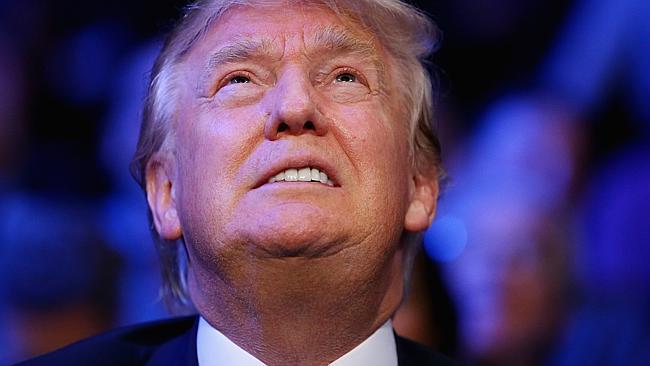
Add your comment to this story
To join the conversation, please log in. Don't have an account? Register
Join the conversation, you are commenting as Logout
Executed man’s surprising last three words
A death-row inmate, whom married just weeks ago, had some unexpected final words seconds before his lethal injection for murdering a pastor.
Kerr: I didn’t use ‘whiteness as an insult’
Sam Kerr has taken the dock in London for a second day with her “stupid and white” comment against a police officer taking centre stage.